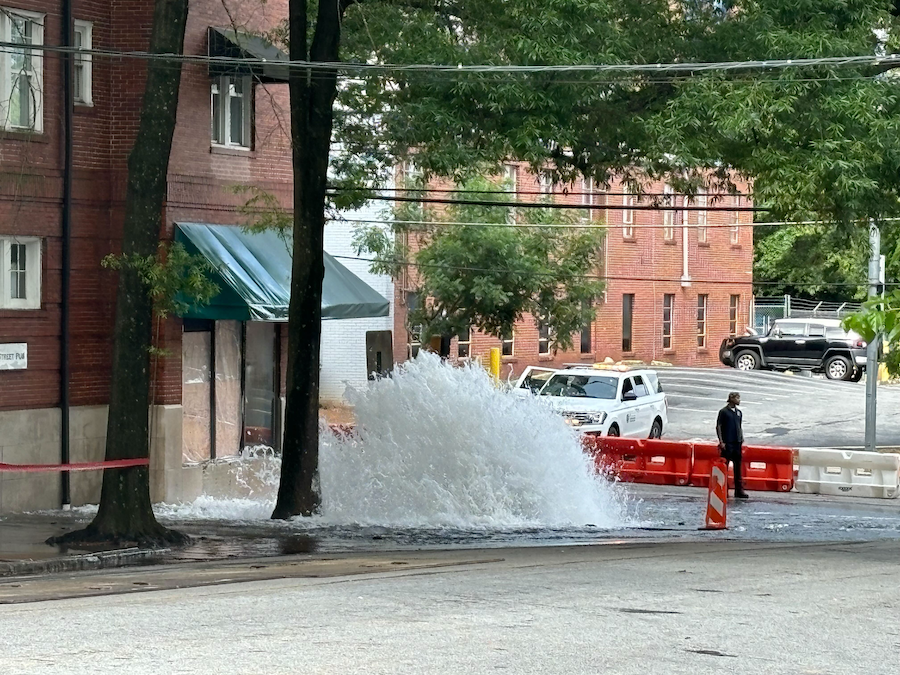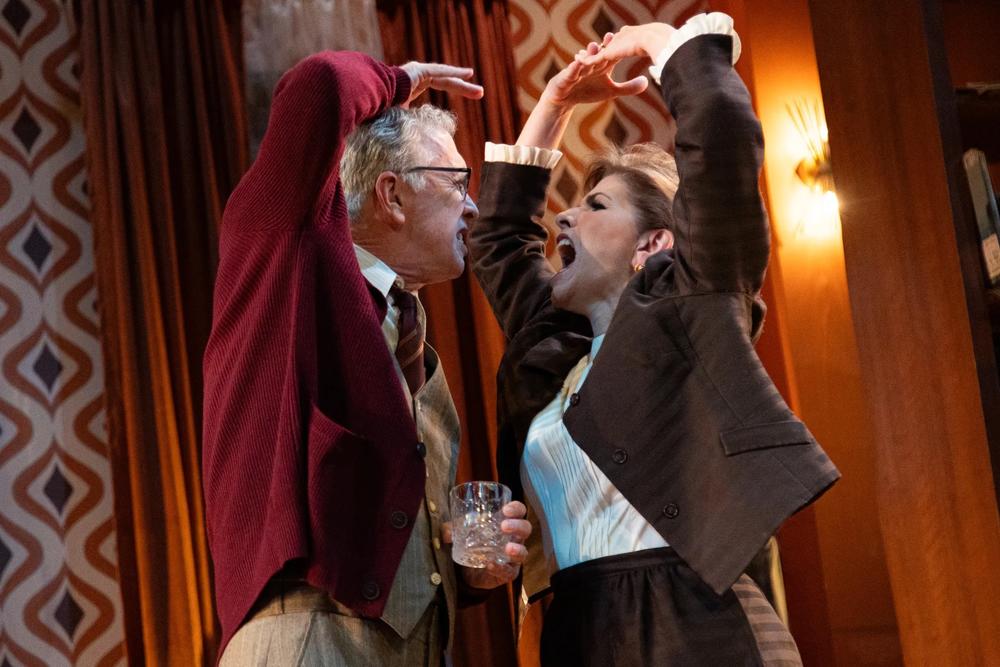
Caption
Water gushing from a broken water main at 11th and West Peachtree in Midtown on Sunday morning, June 2.
Credit: Photo by Beth McKibben

Water gushing from a broken water main at 11th and West Peachtree in Midtown on Sunday morning, June 2.
After two water mains broke in Atlanta on May 31, the city plunged into a water-induced crisis that would last for nearly a week. The original breaks, and subsequent breaks that followed, would disrupt operations for numerous Atlanta businesses, including the arts and entertainment industry.
The largest entertainment story of the crisis centered around State Farm Arena, which had to postpone two Megan Thee Stallion concerts on Friday, May 31 and Saturday, June 1. The Saturday concert, which was scheduled to begin at 8 p.m., was canceled around 6:30 p.m. on the same day.
“After speaking with the Mayor’s office regarding the continued water leak issues affecting downtown Atlanta, the City of Atlanta is unable to accommodate the Megan Thee Stallion performance scheduled for tonight,” posted State Farm to social media.
After the Saturday cancellation, Megan Thee Stallion took to social media to express her displeasure with the way the city handled the situation. The concerts were postponed to Sunday, June 2 and Monday, June 3. According to reporting from the Atlanta Journal-Constitution, State Farm added hand sanitizing stations around the venue in light of the boil water advisory that was in place at the time.
A representative for State Farm declined to comment or provide more details for this story.
The Plaza Theatre closed on May 31 and did not reopen until June 2, although with some restrictions. Owner Chris Escobar said the theater lost nearly $10,000 in revenue over the two days it was closed. While the boil advisory was in effect, the Plaza suspended fountain drink service and didn’t use any ice, and also provided hand sanitizer.
“If we had known it was going to be out all day Saturday, we probably would’ve tried to hire a portable bathroom company trailer because even though those can be $600-1,000 a day, that expense would have been less than the revenue we would’ve lost,” Escobar said in an email.
When it comes to film production in the city, a city spokesperson said that to the best of the city’s knowledge, no productions were affected by the outages.
The Fox Theatre canceled the P1Harmony concert on June 1 and refunded concert goers. The cancellation of the South Korean boy band’s show resulted in a financial loss of hundreds of thousands of dollars, according to a spokesperson for the Fox.
The theater’s run of the Broadway musical Les Miśerables, which started June 4 and ran until June 9, went on as scheduled.

Steve Coulter & Tess Malis Kincaid in Theatrical Outfit’s “Who’s Afraid of Virginia Woolf.”
Theatrical Outfit had to cancel two performances of Who’s Afraid of Virginia Woolf? on May 31 and June 1, according to a spokesperson. The cancellations cost the theater company roughly $7,500 in revenue.
“Beginning on June 2, [Theatrical Outfit] resumed performances while under a boil water advisory,” said Theatrical Outfit Marketing Director Ryan Oliveti in an email. “This meant that all props used in the production were cleaned and made with bottled water. Additionally, for patrons and performers, water bottles were on hand in place of our water fountains.”
The Shakespeare Tavern canceled their second preview performance of Ken Ludwig’s The Three Musketeers on May 31 because of the water outage. According to a spokesperson, the Atlanta Shakespeare Company lost roughly $3,250 in revenue from the canceled performance. The company’s catering partner, Bardic Inspiration, lost roughly $2,000.
“We adjusted the cast and crew call from a performance to a rehearsal call,” said Associate Producer Kati Grace Kirby in an email. “Preview performances are vital in our rehearsal process, particularly with comedies, as the audience reactions give us invaluable feedback about key moments and beats in any production. So, from an artistic perspective, losing that performance opportunity was vastly more significant than canceling a show during the regular run would have been.”
Shakespeare Tavern’s water service was restored by June 1, and staff was able to spend the day preparing food and drink services to operate under the city’s boil advisory.
This story comes to GPB through a reporting partnership with Rough Draft Atlanta.